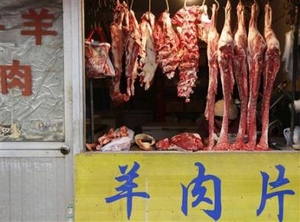 China's consumer price index rose 3.2 percent in February from a year earlier, a 10-month high, official data released on Saturday showed. The pick up in inflation from just 2 percent in January was driven by a 6 percent increase in food costs.
China's consumer price index rose 3.2 percent in February from a year earlier, a 10-month high, official data released on Saturday showed. The pick up in inflation from just 2 percent in January was driven by a 6 percent increase in food costs.Prices that rise too much could jeopardize a government preference to allow economic growth to stabilize after it eased in 2012 to its weakest full-year pace in over a decade. Growth only started to pick up in the fourth quarter after a seven-quarter-long slide.
But if policymakers move too quickly to dampen inflation, they could equally jeopardize the very growth they are trying to nurture. It is a dilemma China's incoming leaders Xi Jinping and Li Keqiang may have hoped they would not have to face so early in the economic recovery.
"This year I think there are three priorities - to stabilize economic growth, which is not too big of a problem, and to stabilize the prices of goods, where already it looks like there could be some pressure," said Zhao Xijun, deputy director of the Finance and Securities Institute at Renmin University. Zhao says the third priority is to reduce the risk from hidden debt, such as off-book wealth management products.
There are already indications China's central bank is shifting its policy focus to inflation from growth. China needs to control inflation as a priority, the central bank said in its fourth-quarter policy report in February, shifting from a pledge in its previous report to support the economy above other needs.
POLICY DILEMMA
Pressures on China's meat prices highlight not only the challenge of bringing inflation under control but also in shifting the economy more towards consumer-led growth, Beijing's stated goal after decades of export-led expansion.
Food prices typically rise ahead of the Lunar New Year holiday -- which occurred in February this year. But since the holiday ended, meat prices, especially for beef and lamb, have stayed elevated.
"Accelerating food prices mean less growth in spending on other goods and services in the economy," Carl Weinberg, the China-watching chief economist at New York consultancy High Frequency Economics, wrote in a client note.
Retail beef prices in Beijing city markets are higher compared with supermarkets outside Boston. Pork, China's staple meat, is about 50 cents/kg below the U.S. price, a Reuters comparison of standard retail prices show.
That's a direct hit on the spending power of Chinese, whose average income is about a tenth that of Americans.
Loss of farmland and farm labor to urbanization - China's cities are swelling as they absorb hundreds of millions of people - and grazing restrictions due to land degradation add to food production costs.
"The more the economy develops, the harder it is to raise calves," said Wang Jimin, who tracks China's cattle trends at the Chinese Academy of Agricultural Science's Rural Economic Development Institute.
"In the short term, I don't see meat prices falling unless there are a lot of imports."
After an international outbreak of mad cow disease a decade ago, China will only allow beef imports from Australia, New Zealand and Uruguay, so options to tame prices with imports appear limited.
INFLATION EXPECTATIONS
China's beef production has decreased every year since 2008, although it could rise by less than 1 percent this year, U.S. Department of Agriculture estimates suggest.
"Cattle take at least a year to raise, not like chickens which need a few months at most. Poultry producers can respond to the market much faster," Yang Shaohui, a poultry vendor in Beijing, said. His chicken was selling for about a third of the price of the beef at a nearby stall.
High feed costs will also help elevate pork prices for the near future. Rising pork prices are expected to drive broader inflation gains by the third quarter.
"It's a question of fundamentals, not monthly CPI fluctuations," said Shi Tao, livestock analyst at eFeedlink in Shanghai. He expects a reduction in pork supplies this year because some pig breeders dropped out of the business after losing money last summer.
Rising food prices represent a sensitive area for China's Communist Party leadership given that social tension has often accompanied past price hikes.
They can fuel inflation expectations that lead to a broader rise in inflation and the risk that the central bank will tweak monetary policy to keep a lid on the price pressures.
But policymakers should resist the temptation for pre-emptive action, said Ting Lu, chief China economist at Bank of America/Merrill Lynch in Hong Kong.
"Though policymakers should be wary of inflation later this year with an economic growth recovery, it's too early to call for significant monetary tightening at present yet," he wrote in a note to clients.





